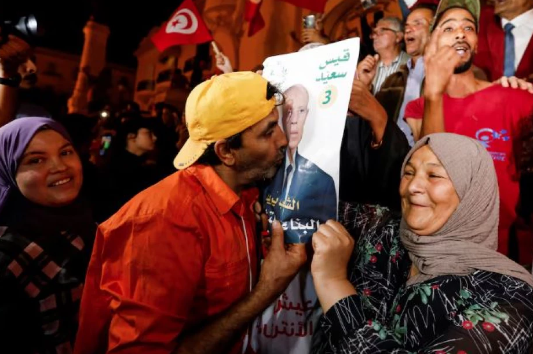Supporters of Tunisian President Kais Saied began celebrations in the capital on Sunday night after an exit poll broadcast on state television showed him securing victory, defeating two rivals, one of whom is currently imprisoned.
Saied faced two election challengers: Zouhair Maghzaoui, leader of the Chaab Party and a former ally turned critic, and Ayachi Zammel, who was jailed last month. According to the election commission, turnout reached 27.7%, which is only half the turnout seen during the runoff round of the 2019 presidential election.
While official results are not expected until Monday evening, an exit poll by the Sigma company showed Saied leading with 89.2% of the votes, as reported by state television. In his initial comments, Saied told state television, “This is a continuation of the revolution. We will build and cleanse the country of the corrupt, traitors, and conspirators.”
Zammel and Maghzaoui’s campaigns dismissed the exit poll, stating that the true results would differ. Despite this, celebrations erupted on Habib Bourguiba Avenue in Tunis, with supporters waving pictures of Saied and the Tunisian flag while chanting, “The people want to build and develop.”
Mohsen Ibrahim, one of the celebrants, said, “We rejoice for a person because he served the state and not for his own benefit. He serves for the people and the state.”
Tunisia had long been seen as a rare success story of the 2011 “Arab Spring” uprisings, transitioning to a competitive, albeit imperfect, democracy after years of autocratic rule. However, rights groups now claim that Saied, in power since 2019, has reversed many of those democratic gains by removing institutional and legal checks on his authority. Saied, 66, denies these accusations, arguing that he is fighting against a corrupt elite and traitors, and that he has no intention of becoming a dictator.
Over the past year, key figures from the largest political parties, most of which oppose Saied, have been imprisoned on various charges. These parties did not publicly back any of the three candidates in Sunday’s election, and several opponents were barred from running.
Wael, a bank employee in Tunis, expressed his dismay, saying, “The scene is shameful. Journalists and opponents are in prison, including one presidential candidate.”
POLITICAL DISQUALIFICATIONS
Political tensions have escalated since last month when an electoral commission, appointed by Saied, disqualified three prominent candidates, sparking protests from opposition and civil society groups. Additionally, lawmakers loyal to Saied recently passed a law stripping the administrative court of its power over election disputes. This court is regarded as the last independent judicial body in Tunisia, following Saied’s dissolution of the Supreme Judicial Council and his dismissal of dozens of judges in 2022.
In contrast to the fiercely contested elections in the years after the 2011 revolution, which saw high voter participation, public frustration with Tunisia’s poor economic performance and widespread corruption has led to growing disillusionment.
Saied, elected in 2019, seized most powers in 2021 when he dissolved the elected parliament and rewrote the constitution, a move the opposition described as a coup.
A referendum on the constitution passed with turnout of only 30%, while a January 2023 runoff for the new, nearly powerless, parliament he created with that constitution had turnout of only 11%.
Although tourism revenues are on the rise and there has been financial help from European countries worried about migration, state finances remain strained. Shortages of subsidised goods are common, as are outages of power and water.



